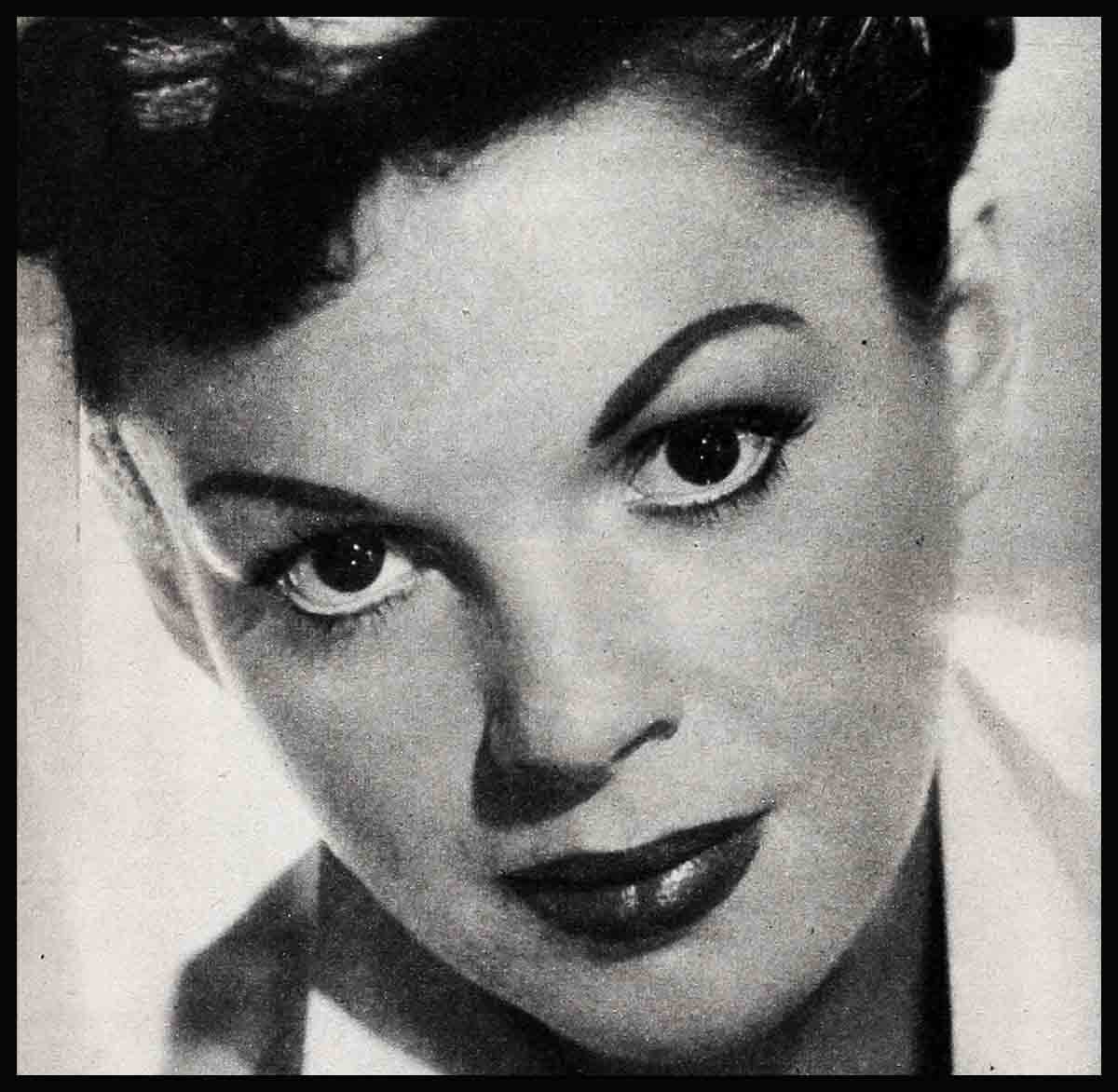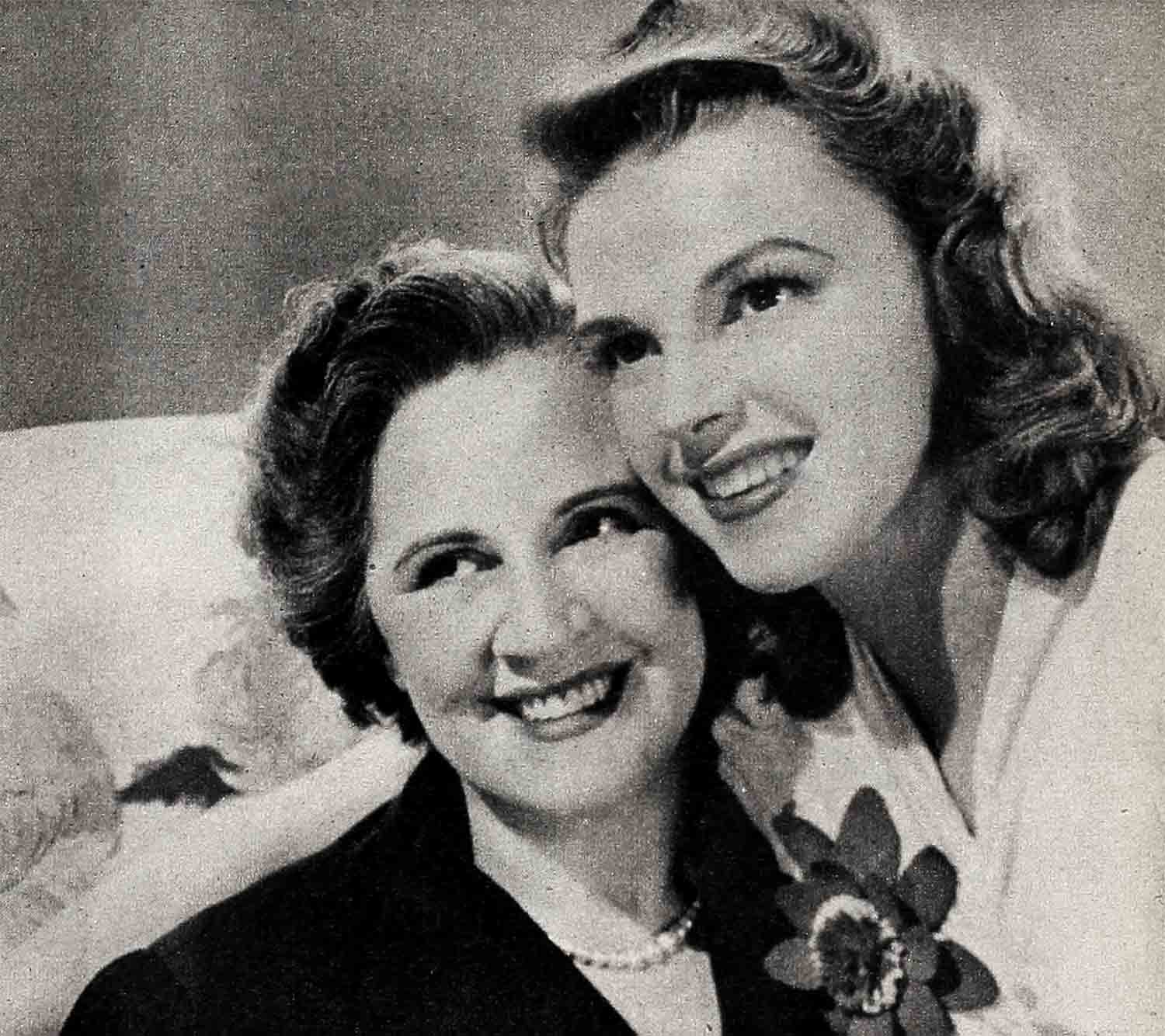
What’s Wrong With Judy Garland And Her Mother?
Maybe I shouldn’t be writing this story. It’s too poignant and perhaps too personal. But I sincerely believe that a little daylight on a sore subject might possibly bring two estranged people, who no doubt still love each other, to open their hearts to each other again. I mean Judy Garland and her mother. Maybe Judy’s mother wouldn’t want me to write this story. But it’s worth a try, anyway.
The desire to put this on paper followed a casual remark I made a while ago to Judy’s mother. “You must be so thrilled about Judy’s expected baby,” I said, forgetting for a moment the rift between the mother and her famous daughter. The sudden weeping shocked me into a realization of my tactlessness. But she composed herself quickly and told me that she hadn’t talked to Judy in a long, long time.
During a conversation with Judy’s mother in July—which I reported in my column—she vehemently denied a remark that a newspaperman had attributed to her just after Judy’s marriage. “I never said Sid Luft was bad for Judy. I don’t know him well. I first talked with him when Judy came to sing here. One night an article appeared in a local newspaper quoting me as having made unflattering remarks about Sid. I went down to the Philharmonic Auditorium where Judy was appearing to see whether she was disturbed by the story. I was told she was not. If Sid Luft will make Judy sees that’s all that matters.”
If the mother and son-in-law have met since then, no reporter has managed to discover the fact. Perhaps they may see each other when Judy goes into the hospital for the delivery of the Lufts’ child—if Judy sends for her mother then, as she did when little Liza was born.
No one seems to know what caused the break between Judy and her mother—neither the mother herself, nor Judy’s former husband, Vincente Minnelli, nor intimates at Metro, who had known both mother and daughter for fifteen years. But then Judy’s was never the traditional “stage mother”; she always kept in the background.
Judy testified to this in an interview two years ago, stating, “My mother is a strong-minded woman, but she was never a ‘stage mama. During those vaudeville years, my sisters and I, while standing in countless wings waiting for our cues, used to hear other mothers threatening their children, saying things like ‘You go on out there or I’ll break your head,’ and it made us kind of sick. Nobody ever talked to me like that or forced me in any way. I drove myself— but it was my own doing.”
In those days, Judy’s mother-has told me, this was a sweet child, loving, generous, unselfish. For the apparent great change in Judy, her mother seemed inclined to blame herself, justly or unjustly, believing that life on the stage or in pictures, with all the publicity, is not a normal life for a child. Well, it’s hard to know where the blame, if there is any blame, lies. And I wouldn’t pinpoint it if I did know. All I’d like to do is bring them together again.
The difficulty possibly started during Judy’s adolescence. Most fifteen-year-old girls believe their elders are plotting to stop them from having fun. I know I thought that when I was fifteen. But there was certainly no indication of a fierce feud when Judy asked me to her mother’s house in Beverly Hills fifteen years ago, for tea, and for a reading of Judy’s poems. They seemed as close and loving as any mother and daughter could be.

A few years later, I heard that Judy had bought her mother and family a house. Still later, Judy moved away from home, possibly feeling, as many young girls do, that she needed more freedom. For an extra motive, I look back to that talk last summer, noted in my column, when Judy’s mother said of her: “That’s all she ever wanted, to be an actress. She never said, ‘I want ‘to be kind,’ or ‘loved,’ only, ‘I want to be famous.’ ”
The first time Judy grasped for something more in her own individual life, her mother obviously was still close to her. When Judy eloped with David Rose, her mother went with her to attend the ceremony, incurring the wrath of Judy’s boss, L. B. Mayer, who refused to speak to Judy’s mother for three months. And when Judy’s marriage to Rose ended in divorce three years later, it was her mother who corroborated her evidence. Judy needed her then, and was not rebuffed. Judy’s wedding to her second husband, Vincente Minnelli, took place in her mother’s home, so the picture was still serene.
But real trouble entered Judy’s life with her serious illness following the birth of daughter Liza. Her father, Frank Gumm, had died soon after Judy signed at Metro, and the pain of his passing had been blurred in the excitement of the new and wonderful world of movies. But when Judy had to go back into the hospital after Liza’s birth, her insomnia, from which she had always suffered, jumped out of control.
Then came the morning when Judy just couldn’t report to work, while a patient studio waited and gave her chance after chance before substituting Betty Hutton in “Annie Get Your Gun,” which Judy wanted to make almost more than she wanted to live. After this, she made “Summer Stock.” While shooting this picture, she was plump, as nature means her to be; she was late and sick every other day, sending the film’s cost skyrocketing. But wasn’t she terrific!
Another chance came with “Royal Wedding.” I had lunch with Judy just before the picture was to start, and she was very excited, telling me about the wonderful dresses she was going to wear. But more sickness, more non-appearances followed, and the incredible happened. Metro let Judy go.
With nightmare suddenness, on the 21st of June, 1950, the world awakened to learn that the darling of the gods, the talented, charming Judy Garland, with everything to live for, had tried to commit suicide by slashing her throat with a broken drinking glass.

Now, for the first time, rumors of differences between mother and daughter began to be heard. It was whispered that Judy’s mother was at first refused admission to Judy’s house by Judy’s husband, Vincente Minnelli, and had to fight her way into Judy’s bedroom. This story is untrue. Judy’s mother was in New York when she heard Judy was in trouble. She boarded the first Los Angeles-bound plane, and was met at the airport by Vincente Minnelli’s car and chauffeur. It is true that she was whisked through a side door, but only to avoid reporters.
“Judy told me she was upset, hysterical and disappointed over losing a movie part,” Judy’s mother said at that time. “I told her everybody in the world feels like doing that at some time or other. She was embarrassed and surprised at the world-wide publicity and said, “Oh, Mother, isn’t that awful!”
That incident, I’m convinced, proves how deep and true are the understanding and the devotion that have existed—and could again exist—between this mother and this daughter. Judy’s mother has told me that she prayed day and night for poor little Judy when she was so ill, and that God answered her prayers. And I know for a fact that she gave up theatre interests in Texas and a big financial consideration to be near her daughter.
But the rift had been healed only temporarily . . . It isn’t easy being the mother of a famous star, even when you and your child are on speaking terms. It’s agony when you’re not. From the attempted suicide to this day, every time anything happens to Judy, the press and photographers want statements and pictures from her mother.
Unlike Shirley Temple’s mother, Margaret O’Brien’s and Elizabeth Taylor’s Judy Garland’s mother was not paid to sit on the set during her daughter’s working days—at least, not until Judy’s latest contract with Metro, which gave her five thousand a week. Then her mother suggested, “Judy, maybe the studio should pay me a hundred a week.”

Judy’s mother now has a job as a clerk, getting up at seven in the morning, never home before six in the evening. Because of the glare of publicity turned upon her every so often, she is anxious about her job, and the worry has aggravated the ulcer from which she suffers. In fairness to Judy, I should pass along this assurance from her press agent: Even while unemployed, Judy has always taken care of her mother financially and paid for insurance policies for her. And Judy has had reason to believe that her sister and her brother-in-law also were contributing to the support of her mother.
But it isn’t my intention to rub either of the principals the wrong way in this sorry disagreement, merely to prove this or that. I just want to help to get them together. For instance, I was quick to give Judy’s mother an opinion from Roger Edens, an M-G-M producer whose friendship dates back even earlier than Judy’s Metro career. (He played for her at her personal appearances before she dreamed of movie stardom.) Edens believes that Luft has been good for Judy.
Judy’s mother admitted she had already heard from other sources that Luft deserved credit for putting the fallen star back on her feet. to be able to make a comeback. But she seemed delighted to hear Edens’ judgment, knowing him as a fine, very intelligent person. Nevertheless, with a mother’s insight, she told me it really all comes to this: It’s up to Judy; to be happy, she has to forget herself, to think more of others—something that will surely happen. one day. Of course, I realize that this is true of all people whose nerves have gotten the better of them.
In the meantime, Judy’s mother said to me, she is learning not to think about her daughter, because she somehow always ends up in tears when she talks about Judy—an embarrassing reaction, since, she assured me, she is not asking for sympathy.
So tragic is any deep difference between mother and daughter that it seems to me both parties deserve sympathy. I can only hope that these two may be reunited. Not on the old basis, perhaps—in human relationships, there is never any going-back—but on a new basis of strong friendship between two fine women.
THE END
—BY SHEILAH GRAHAM
It is a quote. PHOTOPLAY MAGAZINE DECEMBER 1952




